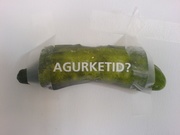Min mediekommentar fra Information fredag d. 9. juni 2006
Den digitale tidsalders ophavsret lanceres omsider også i Danmark
Forrige weekend beslaglagde det svenske politi en større mængde computere fra det svenske website The Pirate Bay, der fungerede som distributionscentral for film, musik-software, computerspil og andre digitale kulturprodukter.
Man kan hævde, at det kun er ret og rimeligt, at musikere, instruktører, forfattere og andre med ophavsret får betaling for deres produkter. Men i en tidsalder, hvor alle kan både forbruge, kopiere og producere digitalt indhold på deres computere, kan man også hævde, at 1800-tallets tankegang om ophavsret i dag er stærkt forældet.
De svenske pirater mener, at alle skal have ret til at tage del i den digitale kultur, fordi det det ikke koster en bøjet fem-øre ekstra at give alle adgang til den. Piraterne mener, at der findes andre modeller til at betale musikere og forfattere. Pladeselskabernes rolle som distributør er overstået, de skal blot talentspejde, producere og markedsføre. Piraterne ønsker ikke at snyde kunstnerne, men at give befolkningen adgang til en moderne variant af folkebiblioteket. Læs også det svenske magasin ETC.
Beslaglæggelsen af The Pirate Bays servere rammer desværre også en gruppe kunstnere, der ikke ønsker at blive omklamret af den internationale underholdningsbranche. En hel del musikere uden for mainstream - altså folk uden pladekontrakt eller aftale med deres nationale udgave af en ophavsretsorganisation, der publicerer deres musik på nettet. De arbejder helt i tidens trend om nettet som et socialt medium, der består af personlige relationer og fri udveksling af kommunikation. Flere af disse kunstnere brugte The Pirate Bay som distributionscentral, men deres produkter blev også beslaglagt af det svenske politi. Uden at de havde brudt loven.
Nu er ophavsret en indviklet affære. Men der findes en løsning, fordi en gruppe jurister fra Stanford University i Californien faktisk har skabt et nyt globalt bud på ophavsret i internettets tidsalder under navnet creative commons (CC). CC er en udvidelse af den traditionelle ophavsret, og denne weekend lanceres en dansk version af licensen.
Selv om man udgiver sit materiale under CC, så har man stadig samme muligheder for repressalier eller søgsmål som ved normal ophavsret. Fidusen er, at en CC-licens er nemmere at forstå for lægmand. Og at den fungerer globalt, fordi den i hvert enkelt land er tilpasset den nationale lovgivning.
Normalt påhviler det brugeren at finde frem til rettighedshaveren og bede vedkommende om tilladelse til at bruge materialet i en anden sammenhæng. Det kan være meget svært. Men hvis vedkommende har valgt en CC-licens fra begyndelsen af, så er det klart, hvad man må og ikke må.
Det gør den yderst velegnet for folk, der publicerer tekst, musik, fotos eller film på nettet.
Hvis man f. eks. ønsker at have styr på ophavsretten til ens fotos på nettet, så de ikke ender i et ugeblad uden ens samtykke, kan man gå ind på http://creativecommons.dk og hente en standardformular til ens hjemmeside. Så har man kontrol over sin egen ophavsret.
Og så kan CC også bruges på film eller bøger i den fysiske verden.
Piratparti og politiske selvmål
Fortalerne for CC mener, at det er en god måde at blive kendt på, hvis ens bog eller film også ligger til gratis download på nettet med en CC-licens, der forbyder kommerciel videreudnyttelse. Et gratis kig kan med andre ord betyde flere solgte bøger i butikken.
Men det er ikke sikkert, at vi taler mainstream produkter. Og tak for det. Det amerikanske magasin Wired havde i maj et sjovt regnestykke. Apples musikbutik iTunes har på tre år solgt én milliard sange. Samtidig har Apple solgt 42 millioner iPods. Wired sammenligner harddiskpladsen på de 42 millioner iPods med antallet af solgte numre og når frem til, at de kun fylder cirka én procent af pladsen. Hvad bruger vi så resten af vores harddiskplads til? Alternativ musik eller digitalt folkebibliotek?
Ifølge Wired bliver der udvekslet næsten én million sange på P2P-netværk, som dem Pirate Bay henviser til - hver måned. Pirate Bay stod for 40 procent af al internettrafik i Sverige. Og i skrivende stund - en uge efter lukningen - er sitet oppe at køre i fire andre lande. Og så har Sverige i øvrigt Piratpartiet, der kæmper for fri ophavsret. Det stiller op til Rigsdagen, og i denne uge fik de 25 procent flere medlemmer på grund af politiets aktion mod The Pirate Bay. Det kan man da kalde selvmål.
P.S. Denne klumme blev i øvrigt skrevet, mens jeg lyttede til svensk elektronmusik fra min iPod udgivet under en åben ophavslicens og downloadet fra Burnstation. Det eneste, den internationale underholdningsbranche har mistet i den sammenhæng, er min tid. Og den er stadig min egen.
Download også podcast med mit interview med folkene bag Burnstation.

